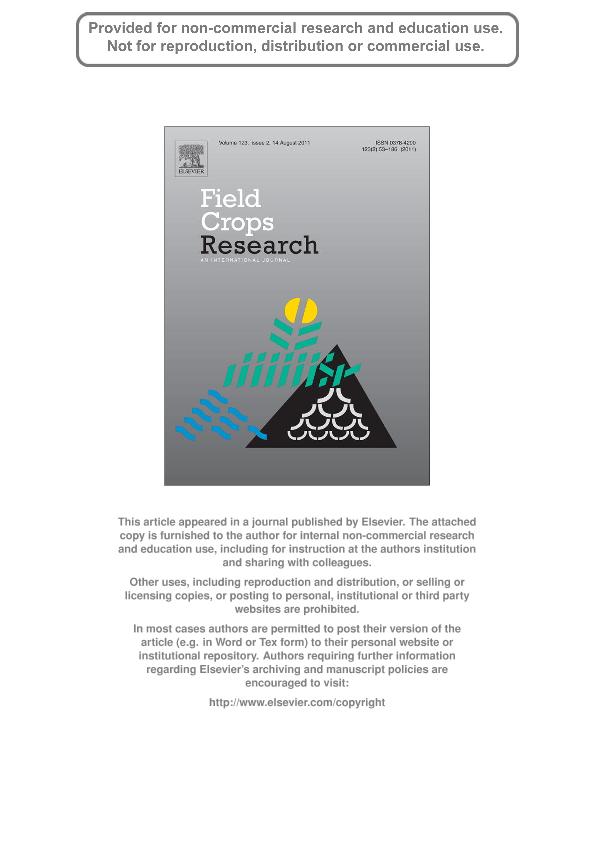Mostrar el registro sencillo del ítem
dc.contributor.author
Rattalino Edreira, Juan Ignacio

dc.contributor.author
Budakli Carpici, E.
dc.contributor.author
Sammarro, D.
dc.contributor.author
Otegui, Maria Elena

dc.date.available
2020-03-10T21:35:09Z
dc.date.issued
2011-08
dc.identifier.citation
Rattalino Edreira, Juan Ignacio; Budakli Carpici, E.; Sammarro, D.; Otegui, Maria Elena; Heat stress effects around flowering on kernel set of temperate and tropical maize hybrids; Elsevier Science; Field Crops Research; 123; 2; 8-2011; 62-73
dc.identifier.issn
0378-4290
dc.identifier.uri
http://hdl.handle.net/11336/99080
dc.description.abstract
Final kernel number in the uppermost ear of temperate maize (Zea mays L.) hybrids is smaller than the potential represented by the number of florets differentiated in this ear, and than the number of silks exposed from it (i.e., kernel set <1). This trend increases when stressful conditions affect plant growth immediately before (GS1) or during (GS2) silking, but the magnitude of change has not been documented for heat stress effects and hybrids of tropical background. In this work we evaluated mentioned traits in field experiments (Exp1 and Exp2), including (i) two temperature regimes, control and heated during daytime hours (ca. 33-40°C at ear level), (ii) two 15-d periods during GS1 and GS2, and (iii) three hybrids (Te: temperate; Tr: tropical; TeTr: Te×Tr). We also measured crop anthesis and silking dynamics, silk exposure of individual plants, and the anthesis-silking interval (ASI). Three sources of kernel loss were identified: decreased floret differentiation, pollination failure, and kernel abortion. Heating affected all surveyed traits, but negative effects on flowering dynamics were larger (i) for anthesis than for silking with the concomitant decrease in ASI, and (ii) for GS1 than for GS2. Heat also caused a decrease in the number of (i) florets only when performed during GS1 (-15.5% in Exp1 and -9.1% in Exp2), and only among Te and TeTr hybrids, (ii) exposed silks of all GS×Hybrid combinations, and (iii) harvestable kernels (mean of -51.8% in GS1 and -74.5% in GS2). Kernel abortion explained 95% of the variation in final kernel numbers (P<0.001), and negative heat effects were larger on this loss (38.6%) than on other losses (≤11.3%). The tropical genetic background conferred an enhanced capacity for enduring most negative effects of heating.
dc.format
application/pdf
dc.language.iso
eng
dc.publisher
Elsevier Science

dc.rights
info:eu-repo/semantics/openAccess
dc.rights.uri
https://creativecommons.org/licenses/by-nc-sa/2.5/ar/
dc.subject
FLOWERING DYNAMICS
dc.subject
GENOTYPES
dc.subject
HEAT STRESS
dc.subject
KERNEL SET
dc.subject
MAIZE
dc.subject
SILK EXPOSURE DYNAMICS
dc.subject.classification
Agricultura

dc.subject.classification
Agricultura, Silvicultura y Pesca

dc.subject.classification
CIENCIAS AGRÍCOLAS

dc.title
Heat stress effects around flowering on kernel set of temperate and tropical maize hybrids
dc.type
info:eu-repo/semantics/article
dc.type
info:ar-repo/semantics/artículo
dc.type
info:eu-repo/semantics/publishedVersion
dc.date.updated
2020-02-07T13:48:34Z
dc.journal.volume
123
dc.journal.number
2
dc.journal.pagination
62-73
dc.journal.pais
Países Bajos

dc.journal.ciudad
Amsterdam
dc.description.fil
Fil: Rattalino Edreira, Juan Ignacio. Consejo Nacional de Investigaciones Científicas y Técnicas. Oficina de Coordinación Administrativa Parque Centenario. Instituto de Investigaciones Fisiológicas y Ecológicas Vinculadas a la Agricultura. Universidad de Buenos Aires. Facultad de Agronomía. Instituto de Investigaciones Fisiológicas y Ecológicas Vinculadas a la Agricultura; Argentina. Universidad de Buenos Aires. Facultad de Agronomía. Departamento de Producción Vegetal; Argentina
dc.description.fil
Fil: Budakli Carpici, E.. Uludag University. Faculty of Agronomy. Department of Field Crops; Turquía. Universidad de Buenos Aires. Facultad de Agronomía. Departamento de Producción Vegetal; Argentina
dc.description.fil
Fil: Sammarro, D.. Universidad de Buenos Aires. Facultad de Agronomía. Departamento de Producción Vegetal; Argentina
dc.description.fil
Fil: Otegui, Maria Elena. Consejo Nacional de Investigaciones Científicas y Técnicas. Oficina de Coordinación Administrativa Parque Centenario. Instituto de Investigaciones Fisiológicas y Ecológicas Vinculadas a la Agricultura. Universidad de Buenos Aires. Facultad de Agronomía. Instituto de Investigaciones Fisiológicas y Ecológicas Vinculadas a la Agricultura; Argentina. Universidad de Buenos Aires. Facultad de Agronomía. Departamento de Producción Vegetal; Argentina
dc.journal.title
Field Crops Research

dc.relation.alternativeid
info:eu-repo/semantics/altIdentifier/doi/http://dx.doi.org/10.1016/j.fcr.2011.04.015
dc.relation.alternativeid
info:eu-repo/semantics/altIdentifier/url/https://www.sciencedirect.com/science/article/pii/S0378429011001407
Archivos asociados
